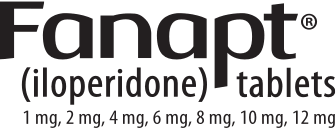Schizophrenia : Symptoms, Causes and Treatments
Schizophrenia is more common than you may think. It affects about one in 300 people around the world. In the United States, about one percent of the population has schizophrenia.
While living with schizophrenia can be challenging and disruptive to everyday life, the condition can be managed with treatmentand it’s possible for those suffering from schizophrenia to live a full life. This guide will break down how to recognize signs of schizophrenia, how to obtain a diagnosis and available treatment options to overcome the mental illness.
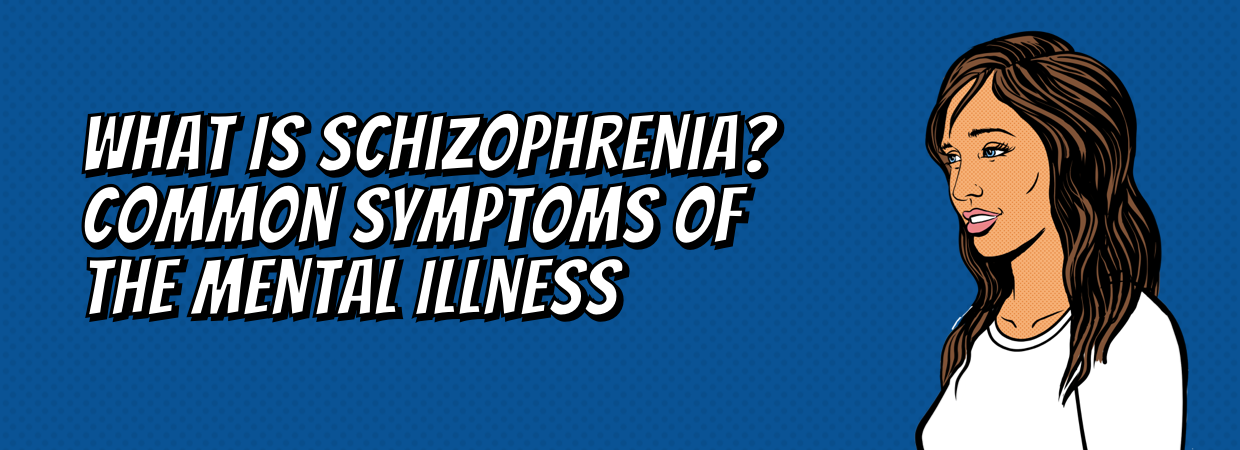
Schizophrenia is a serious mental health disorder that interferes with a person’s perception of reality. It’s a type of mental illness known as a “psychosis,” in which a person cannot differentiate between what’s real and what’s imagined. People with schizophrenia may have a combination of delusions, hallucinations and disordered thinking.
These symptoms can lead to erratic behavior that can interfere with day-to-day functioning and can become debilitating.
Early Stage Symptoms of Schizophrenia
Schizophrenia can occur at any age, but the majority of times, the onset of symptoms happens during adolescence and early adulthood.
Schizophrenia can be difficult to diagnose in teenagers because many of the symptoms mirror typical adolescent behavior. Early signs of schizophrenia can include:
- Irritability
- Problems with sleep
- A drop in grades or disinterest in school
- Lack of motivation
- Isolating or withdrawing from others
In young people, the early stage of schizophrenia is known as the “prodromal period.” During this time, unusual thoughts or suspicions may increase.
Later Stage Symptoms of Schizophrenia
After the prodromal stage, symptoms of schizophrenia can become more disturbing. These symptoms can fluctuate in type and severity over time. Some symptoms may be present continuously, while others may worsen or completely disappear at times.
While the illness manifests differently in each person, common symptoms of schizophrenia include the following:
Delusions:
These are firmly held beliefs that are not rooted in reality. Delusions may include thinking you’re being harmed or harassed, having irrational fears that others are “out to get you,” the belief that you have extraordinary powers or abilities or thinking there are special messages being broadcast to you by the television, radio or Internet.
Hallucinations:
These involve seeing, smelling, feeling or hearing things that do not exist. However, to the individual with schizophrenia, hallucinations are felt to the full extent of a normal experience. Hearing voices is the most common hallucination for people with schizophrenia.
Thought and speech disorder:
This symptom manifests in impared communication. For example, responses to questions may be incomplete or completely unrelated to the topic of discussion. In rare cases, people with schizophrenia may put together meaningless sounds or words that others cannot understand.
Negative symptoms:
These are a group of symptoms hindering a person’s ability to function normally, such as neglecting personal hygiene, reduced motivation, difficulty planning or partaking in activities, reduced expression of emotions in facial expression or tone of voice, social withdrawal and a diminished feeling of pleasure.
Abnormal behavior:
This can encompass everything from childlike tendencies to unpredictable agitation and irritability. Common examples of abnormal behavior include the refusal to follow instructions, erratic or bizarre postureand inappropriate or excessive movement.
Cognitive symptoms:
These can include problems with memory, difficulty processing new information and trouble with focusing and paying attention.
Common Schizophrenia Complications
If left untreated, schizophrenia can lead to a number of complications that can greatly impact every aspect of the person’s life. These include:
- Suicide or suicidal thoughts
- Substance abuse
- Inability to work or attend school
- Social isolation
- Financial problems
- Homelessness
Types of Schizophrenia
Schizophrenia manifests differently from one person to the next. Depending on the individual, some symptoms may be more dominant than others. Generally, there are four main categories of schizophrenia:
Paranoid schizophrenia
With this type of schizophrenia, the person’s delusions lead to extreme paranoia. Oftentimes, people with paranoid schizophrenia falsely believe they are being persecuted or punished by someone. Common themes seen in people with paranoid schizophrenia include the belief that their spouse is cheating on them, people in their community are conspiring against them or that the government is spying on them.
Catatonic schizophrenia
People with this type of schizophrenia shut down mentally, emotionally, and physically. They often have no facial expressions and stand or sit still for extended periods of time. If a person remains catatonic for several hours, it becomes a medical emergency.
Undifferentiated schizophrenia
Individuals with this type of schizophrenia have a combination of symptoms without any that are dominant. They may be paranoid and confused and may not speak or express themselves much. They also may not maintain their hygiene.
Schizoaffective disorder
These individuals experience delusional thinking and other symptoms of schizophrenia in combination with symptoms of a mood disorder like depression, mania or hypomania.
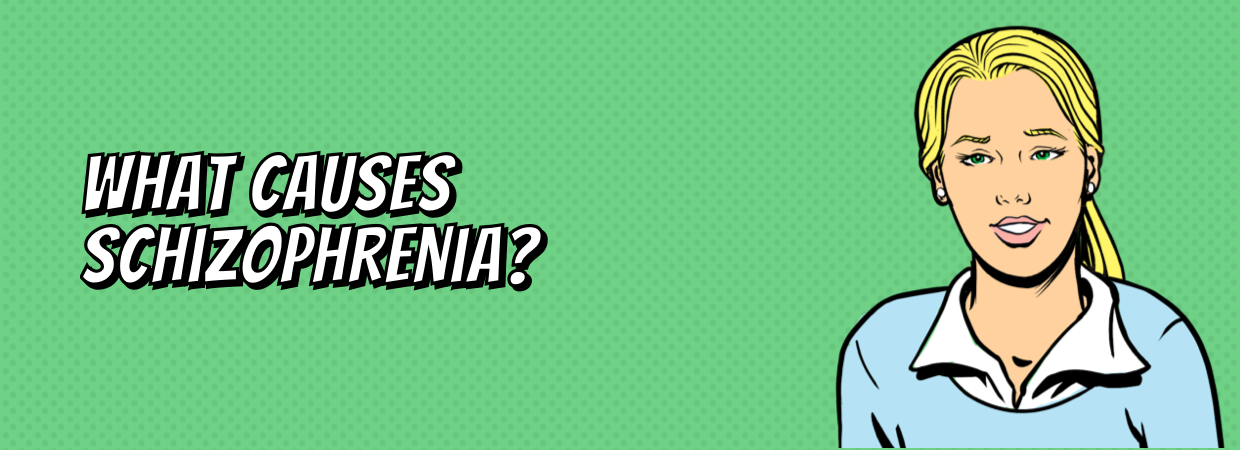
There is no single cause of schizophrenia. In fact, scientists do not fully understand what causes the mental illness, but it is believed that a number of factors are at play. These include:
Genetics:
Schizophrenia runs in families . Individuals with a close relative who has schizophrenia are more likely to also receive a diagnosis. However, it’s important to note that just because one family member has schizophrenia, that doesn’t mean others in the family will have it. According to genetic studies, a number of different genes can increase the risk of schizophrenia , but there is no specific gene that is the cause. So far, it’s impossible to predict who will develop schizophrenia based on genetic information.
Brain structure and function:
In addition to genetics, scientists believe differences in brain structure and function also play a role in the development of schizophrenia . Studies show differences in the volumes of specific parts of the brain, as well as the ways in which regions of the brain connect and work together in people with schizophrenia. Issues with neurotransmitters glutamine and dopamine (naturally occurring brain chemicals) may also contribute to schizophrenia.
Environment:
Scientists believe genetic risk coupled with certain environmental risk factors may offset the development of schizophrenia . Exposure to viruses or toxins and malnutrition before birth, especially in the first or second trimester can increase the risk of schizophrenia. Stressful surroundings, such as living in poverty, may also play a role in triggering schizophrenia.
Risk Factors for Schizophrenia
There are several risk factors for schizophrenia, including age, family history and illicit drug use.
Age:
Anyone at any age can get schizophrenia. However, symptoms are more likely to begin in teenage years or young adulthood. In men, schizophrenia usually appears in adolescence or in the 20’s. In women, it is more likely to occur in the 20’s or 30’s. People are rarely newly diagnosed with schizophrenia after the age of 45.
Family history:
Heredity plays a strong role in the risk of developing schizophrenia. In fact, one study found that the likelihood of developing the mental illness is more than six times higher for individuals who have a close relative with schizophrenia, such as a parent or sibling.
Illicit drug use:
Teenagers who use mind-altering drugs, such as methamphetamines or LSD, have a higher risk of schizophrenia. A growing body of evidence also suggests that marijuana usage increases the risk of psychotic episodes. The risk becomes greater the younger an individual starts using and the more frequent the use.
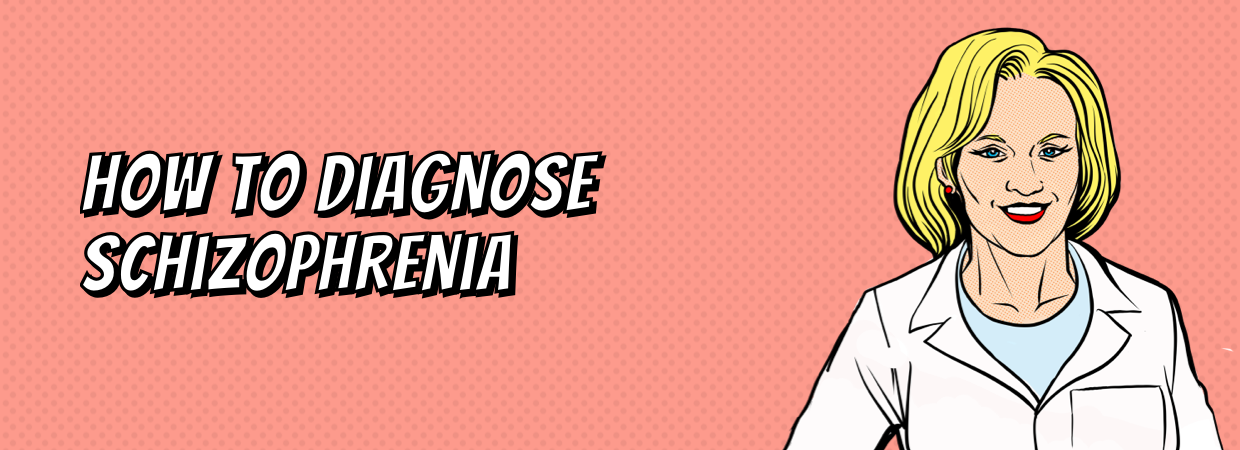
If you’re experiencing signs of schizophrenia like hallucinations, delusions and disordered thinking and speech, see your doctor. There is no one single schizophrenia test. Rather, a health care provider will survey your symptoms and evaluate you to determine if you have the mental illness.
Rule Out Drug Use
The first step to diagnosing schizophrenia is ruling out other causes of symptoms. Using certain drugs like methamphetamines or LSD can lead to symptoms that mirror schizophrenia. A doctor must rule out drug use, as well as other factors like brain tumors and other psychiatric disorders, such as bipolar disorder, that could cause similar symptoms. To do this, a doctor may perform a physical exam, screenings for drugs and alcohol and imaging tests like a CT scan or MRI.
Schedule a Psychiatric Evaluation
The next step in a schizophrenia diagnosis is psychiatric evaluation. A mental healthcare provider will check an individual’s mental status by asking questions about thoughts, mood, hallucinations, delusionsand the potential for violence or suicide. They’ll also observe the patient’s appearance and demeanor.
Identify Key Schizophrenia Symptoms
According to the Diagnostic and Statistical Manual of Mental Disorders (DSM-5) , published by the American Psychiatric Association, to be diagnosed with schizophrenia, a person must have two or more of the following symptoms, each present for a significant amount of time during a one month period (at least one of the symptoms must be delusions, hallucinations or disorganized speech):
- Delusions
- Hallucinations
- Disorganized speech
- Disorganized or catatonic behavior
- Negative symptoms
Oftentimes, the presence of delusions or hallucinations alone can be enough for a doctor to make a schizophrenia diagnosis.
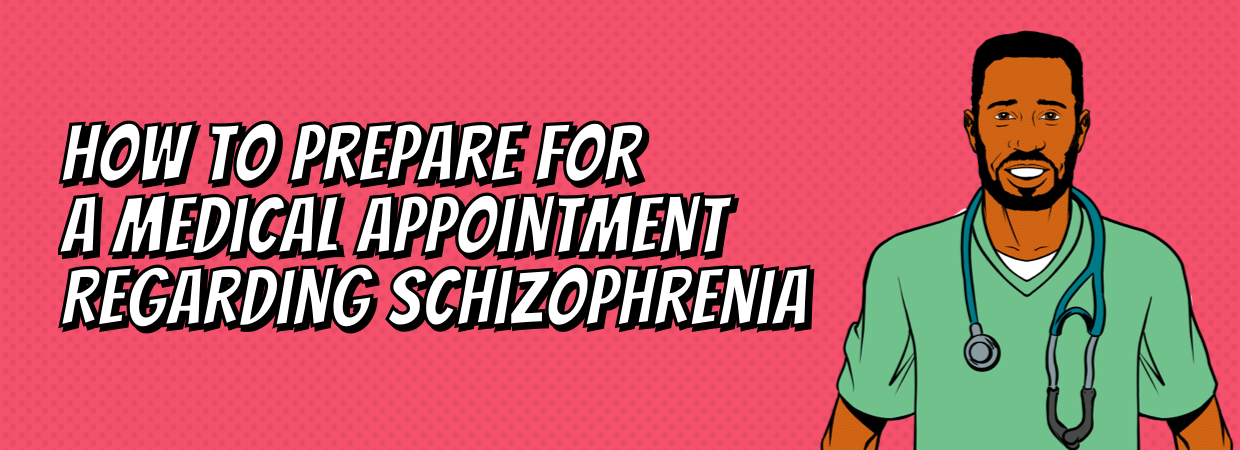
If you think you or a loved one may have schizophrenia, you may start by making an appointment with your family doctor, who then can refer you to a psychiatrist who treats the mental illness.
To prepare for your appointment, it can be a good idea to make a list of the following:
- Symptoms you or your loved one are experiencing
- Medications you or your loved one are taking, including vitamins, herbsor other supplements. Also make note of the dosage.
- Personal information, including recent stressors or life changes
- Family history of known health conditions, especially if another member of your family has schizophrenia or another mental illness
- Questions you may have for the doctor
If possible, bring a loved one to the appointment. Family support can be crucial when coping with a schizophrenia diagnosis and managing treatment.
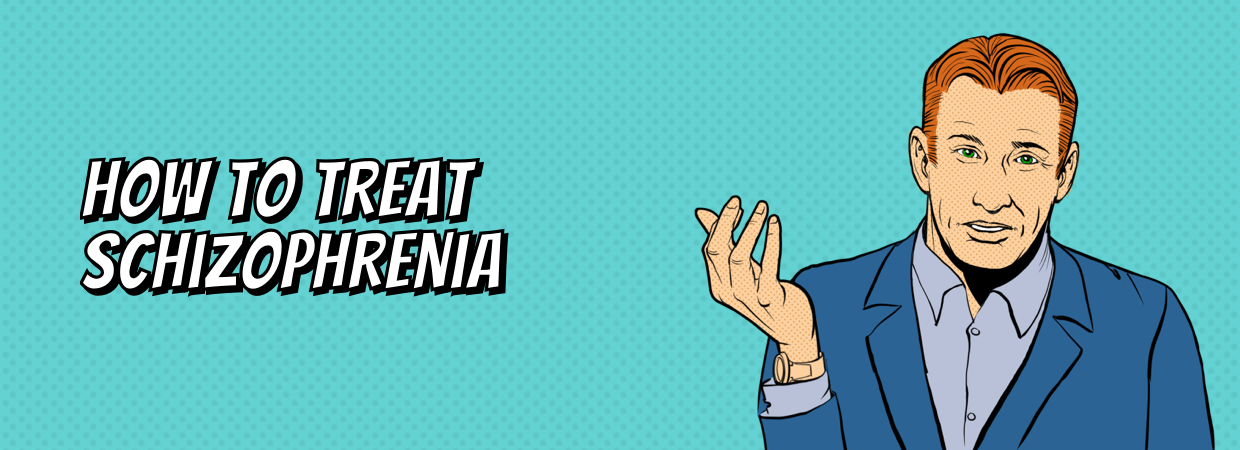
There is no cure for schizophrenia and it’s a condition that must be managed throughout the course of a person’s life. However, treatment options are available that can lessen or stop psychotic symptoms. With treatment, a person with schizophrenia can go on to live a full life.
A number of medications are available to treat symptoms of schizophrenia and can help reduce the frequency and intensity of psychotic episodes. A doctor or psychiatrist will work with patients to determine the appropriate medication and dosage.

Individuals with schizophrenia can benefit from a combination of medication and psychosocial treatments. These therapeutic approaches for schizophrenia include:
Individual Therapy
Psychotherapy or talk therapy, involves regularly speaking with a mental healthcare provider about your moods, feelings and thoughts. This can help people with schizophrenia normalize their thinking patterns and learn how to cope with stress. It can also help identify early warning signs of a psychotic episode in order to prevent a relapse.
Social Skills Training
These are classes focused on helping individuals with schizophrenia manage their relationships and get along better with people in their daily life. This may include family members and coworkers, as well as strangers and other people the patient may interact with in social situations. Topics can include how to behave appropriately in public spaces, successful communication skills, how to cope with anger and frustration, how to accept criticism, how to take care of your basic needs like grooming and hygiene and how to manage money.
Family Therapy
For many people living with schizophrenia, family support plays an integral role in managing their condition. Family therapy provides education for loved ones on the symptoms and treatment options for schizophrenia, as well as strategies for how they can best help the person with the illness. It also provides an outlet to discuss how to manage stress and cope with the difficulties of caregiving. The more knowledge family members have about the illness and the more they feel like members of the care team, the better the outcome for all those involved.
Vocational Rehabilitation and Supported Employment:
These programs help people with schizophrenia find and keep jobs. They focus on career counseling, job-seeking skills and help navigating the job market. For people with serious illnesses, finding and maintaining a job not only provides income but can improve self-esteem, social skills, and integration into the community.
Programs to Help People With Schizophrenia
Specific psychosocial programs have been developed to help people with schizophrenia manage their condition. These include:
Coordinated Specialty Care (CSC)
This is a recovery-oriented treatment program for those experiencing symptoms of early psychosis, which is an early stage of schizophrenia. A team of healthcare professionals work together to deliver psychotherapy, medication management, family education and support, case management and education and employment support. The program is proven to be effective at reducing symptoms and improving quality of life for people with early schizophrenia.
Assertive Community Treatment (ACT)
This program is designed for people with schizophrenia who are at risk of repeat hospitalizations or homelessness. ACT programs are community-based, meaning people can receive treatment at home (rather than a hospital or residential setting). Treatment plans are personalized, but often include individual support therapy, medication management, substance abuse treatment, behavior-oriented skill training, supported employment and family support and education.
Living Well With Schizophrenia
While a schizophrenia diagnosis can be daunting, it does not mean you’re doomed to a life of despair. Plenty of people with schizophrenia go on to live happy and full lives.
In addition to keeping up with your treatment program, certain lifestyle changes can help you live well with schizophrenia. These include:
Avoid alcohol and drug use
Using alcohol, nicotine or illicit drugs can interfere with schizophrenia treatment and make symptoms worse. If you are struggling with addiction, substance use treatment programs can help.
Educate yourself about schizophrenia
Learning as much as you can about the mental illness, as well as your personal symptoms and triggers, can help prevent a relapse.
Maintain a healthy weight
Eating a nutritious diet and getting regular physical activity can ward off obesity and other health conditions and improve your overall quality of life.
Get quality sleep
Sleep is essential for maintaining overall health. Unfortunately, many people with mental illnesses like schizophrenia tend to experience disrupted sleep patterns. Try to get on a regular sleep schedule and avoid caffeine, alcohol and nicotine before bed.
Learn stress-reduction techniques
Stress can be a major trigger for schizophrenia symptoms. Learning how to cope with stress can help manage your illness and make you feel better overall. Stress-reduction techniques may include meditation, deep breathing exercises, listening to calming music, yoga or tai chi.
Join a support group
Speaking with others living with schizophrenia can connect you to people facing similar challenges and help with feelings of isolation. Support groups are also available for loved ones of people with schizophrenia.
Summary
Ultimately, there are plenty of options available to manage and treat schizophrenia. Despite the challenges that come with living with a severe mental illness, a number of resources exist to help you overcome those obstacles and live a full life.
Talk to your doctor about the appropriate treatment plan for you and ask about the social services available to assist you with school or work support, social skills training and other daily activities.
INDICATION AND IMPORTANT SAFETY INFORMATION
Fanapt® (iloperidone) is a prescription medication used for the treatment of schizophrenia and the acute treatment of manic or mixed episodes associated with bipolar I disorder in adults.
WARNING: Elderly patients with psychosis related to dementia (having lost touch with reality due to memory loss and experiencing a decline in day-to-day functioning) who are treated with antipsychotic medications are at an increased risk of death compared to patients treated with a placebo. Fanapt® is not approved for use in people with dementia-related psychosis.
WARNINGS AND PRECAUTIONS
- Patients should not use Fanapt® if they have a known allergy to Fanapt® or its ingredients. Allergic reactions, including anaphylaxis, rapid swelling of the skin (angioedema) and other symptoms of allergy (eg, throat tightness; swelling of the throat, face, lips, mouth and tongue; hives; rash and itching) have been reported.
- An increased risk of stroke has been reported in clinical studies of elderly people with dementia-related psychosis. Fanapt® is not approved for use in people with dementia-related psychosis.
- Fanapt® may change your heart rhythm (meaning there is more time between heartbeats). Heart rhythm changes have occurred in patients taking Fanapt® and are a risk factor for serious, even life-threatening medical issues. You should tell your healthcare provider if you have or have had heart problems. Contact your healthcare provider right away if you feel faint or have unpleasant feelings of irregular or forceful heartbeats as any of these feelings could be a sign of a rare, but serious side effect that could be fatal. You should not use Fanapt® with other drugs that are known to cause these same heart rhythm issues.
- Tell your healthcare provider if you have some or all of the following symptoms: very high fever, rigid muscles, shaking, confusion, sweating or increased heart rate and blood pressure. These may be signs of a condition called neuroleptic malignant syndrome (NMS), a rare but serious side effect that could be fatal. This may happen with Fanapt® or drugs like it.
- Abnormal or uncontrollable movements of the face, tongue or other parts of the body may be signs of a serious condition called tardive dyskinesia (TD), which could become permanent. The chance of this condition going away decreases, depending on how long and how much medication has been taken. Tell your healthcare provider if you have body movements you can't control.
- Fanapt® and medicines like it have been associated with metabolic changes (high blood sugar, high cholesterol and triglycerides, and weight gain) that can increase cardiovascular/cerebrovascular risks. Increases in blood sugar levels (hyperglycemia), which in some cases can be serious and associated with coma or death, have been reported in patients taking Fanapt® and medicines like it. Changes in cholesterol and triglycerides have been seen in patients taking Fanapt® and medicines like it. Some patients may gain weight while taking Fanapt®. Your healthcare provider should check your blood sugar, fat levels and weight before you start and regularly while you take Fanapt®.
- Tell your healthcare provider about any medical conditions that you have, including problems with your liver. Fanapt® is not recommended for patients with severe liver problems.
- Tell your healthcare provider if you have a history of or have a condition that may increase your risk for seizures before you begin taking Fanapt®.
- Light-headedness or faintness caused by a sudden change in heart rate and blood pressure when rising quickly from a sitting or lying position (orthostatic hypotension) has been reported with Fanapt®. This condition is most common when you start therapy, when restarting treatment or when the dose of Fanapt® is increased. You should consult your healthcare provider if you have or have had heart problems or conditions that lead to these sudden changes since Fanapt® should be used with caution in these patients.
- Fanapt® may increase the risk of falls, which could cause fractures or other injuries.
- Decreases in infection-fighting white blood cells (WBCs) have been reported in some patients taking antipsychotic agents. Patients with a preexisting history of low WBC count or who have experienced a low WBC count due to drug therapy should have their blood tested and monitored during the first few months of therapy. Some (including fatal) cases of agranulocytosis, a serious decrease in specific types of WBCs called neutrophils or granulocytes, have been reported in drugs like Fanapt®.
- Fanapt® can increase the level of the hormone prolactin. Tell your healthcare provider if you experience breast enlargement, breast pain or breast discharge, abnormal menstrual cycles in females or impotence in males. If elevated levels of prolactin persist, this may lead to bone loss.
- Medicines like Fanapt® can impact your body's ability to reduce your body temperature. You should avoid overheating and dehydration.
- Fanapt® and medicines like it have been associated with swallowing problems (dysphagia). If you have or have had swallowing problems, you should tell your healthcare provider.
- For males, in the rare event you have a painful or prolonged erection (priapism) lasting 4 or more hours, stop using Fanapt® and seek immediate medical attention.
- Fanapt® and medicines like it can affect your judgment, thinkingor motor skills. You should not drive or operate hazardous machinery, including automobiles, until you know how Fanapt® affects you.
- A condition called intraoperative floppy iris syndrome has been observed in some patients taking drugs like FANAPT®. Please tell your healthcare provider if you take or have taken Fanapt® before cataract or other eye surgeries.
- The most common side effects for Fanapt® versus placebo in patients with schizophrenia were dizziness, dry mouth, feeling unusually tired or sleepy, stuffy nose, feeling faint/light-headed when standing quickly, racing heartbeat and weight gain. The most common side effects for Fanapt® versus placebo in a clinical study of patients with bipolar I disorder were racing heartbeat, dizziness, dry mouth, increase in liver enzymes, stuffy nose, weight gain, low blood pressure and feeling unusually tired or sleepy. Compared to placebo, the average weight gain in clinical studies in schizophrenia lasting 4 to 6 weeks was 6 poundsand in a clinical study of patients with bipolar I disorder over 4 weeks was 7 pounds. If you experience any of these symptoms, talk with your healthcare provider.
- When taking Fanapt®, you should avoid drinking alcohol and you should not breastfeed.
- You should notify your healthcare provider if you become pregnant or intend to become pregnant while taking Fanapt®.
- Tell your healthcare provider about all prescription and non-prescription medicines and supplements you are taking. Some medications may interact with Fanapt®.
- To access the full Prescribing Information, including BOXED WARNING, visit www.Fanapt.com.
- You are encouraged to report negative side effects of prescription drugs to the FDA. Visit www.fda.gov/medwatch or call 1-800-FDA-1088.
